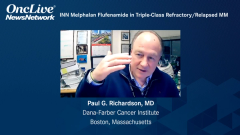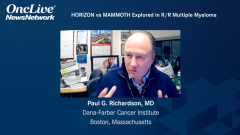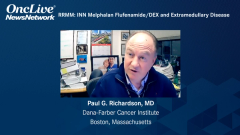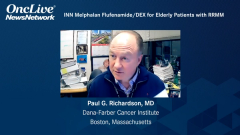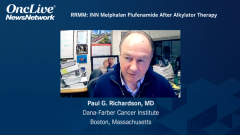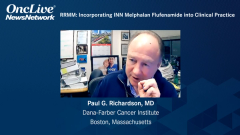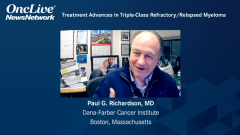
RRMM: INN Melphalan Flufenamide After Alkylator Therapy
Episodes in this series

Paul G. Richardson, MD: One of the key questions when thinking about the results from HORIZON and the use of melflufen is how this drug performs in patients who have become resistant to alkylator treatment or have prior alkylator exposure. One of the most interesting papers around this was presented at ASH [American Society of Hematology Annual Meeting], in which we looked at melflufen plus dexamethasone in the context of both the HORIZON and O-12-M1 studies and looked at those who had prior exposure to alkylator therapy and how this behaved.
When we looked at this group of patients, we were able to demonstrate quite nicely that these patients had responses to melflufen. Let’s just focus on specifically the HORIZON data. Approximately 92 of 157 patients were alkylator-refractory, and 76 had been exposed to melphalan. We were able to show that the response rate in those who were alkylator refractory was 20%. The median progression-free survival was 3.7 months, with the median duration of response of 4.2 months. If we look at the melphalan-exposed patients, the response rate was 26%, the median PFS [progression-free survival] was actually slightly better at 3.9 months, and the median DOR [duration of response] was 5.1 months.
A critical question is always overall survival. How does that compare? If we look at the group overall, the survival was a median of 11.6 months—almost a year. In that context, those who were truly alkylator-refractory at the time of study entry were shown to have a median overall survival of 9.7 months. At the same time, for those who were melphalan exposed: 11.2 months. If we looked at the treatment durations—because that would also be relevant—if you’re alkylator exposed for more than 6 months, how did you do? Very excitingly, we’re able to show that median overall survival in those patients was around 8.4 months. For those who were exposed to less than 6 months of alkylator treatment, the median overall survival improved to 10 months, with response rates, DORs, and PFSs that were very similar.
We thought that the combination of melflufen and dexamethasone working so consistently in previously alkylator-exposed patients was a very striking positive. When we also looked at the safety profile, we found it was very similar. The myelosuppression was obviously our biggest issue, but the most common nonhematologic AEs [adverse events] were not magnified. There was a relatively low rate of upper respiratory tract infection and pneumonia of around 10% in this particular subgroup. When we looked at febrile neutropenia, this was relatively uncommon at around 5%. This would suggest that the tolerability of the platform is quite favorable. I’d reiterate no hair loss, no mucositis, and nonhematologic toxicity of this drug is quite modest, with the convenience of being infused once a month in combination with dexamethasone.
Obviously, we’ve got a lot to learn about long-term adverse effects from melflufen, and we’re gathering data in that regard. It’s very early in that process. A question I’m often asked is if we’re seeing secondary AML [acute myeloid leukemia] or MDS [myelodysplastic syndrome] arising from melflufen exposure. If we looked at the data set overall, those rates are fairly low—fewer than 5 patients overall—in whom this has occurred. But this is an area we have to watch carefully because if patients continue on treatment, we need to be very aware of this as a potential long-term adverse effect. When we think about this as a drug that’s working in the setting of very refractory disease, in which there are no other effective treatment options, it’s very encouraging to see the kind of responses and outcome data.
Finally, as we think about this in the context of melflufen use, probably the most exciting data I saw at the meeting was the combination data from my colleague Dr Enrique Ocio, in which he combined melflufen with bortezomib on the 1 hand and daratumumab on the other. The response rates for both combination strategies were outstanding, in my opinion. I believe that’s the future direction in which melflufen will go in combination with other drugs so that we can maximize its therapeutic potential.
Transcript Edited for Clarity


